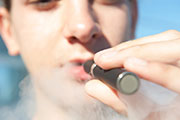
THURSDAY, April 16, 2015 (HealthDay News) — E-cigarettes are booming among U.S. teens, with nearly 2.5 million middle and high school students now choosing to “vape” rather than smoke traditional cigarettes or indulge in other forms of tobacco, federal health officials reported Thursday.
E-cigarette use among middle and high school students tripled from 2013 to 2014, making the nicotine-delivery devices the most popular tobacco product now used by American teens, according to data from the U.S. Centers for Disease Control and Prevention’s 2014 National Youth Tobacco Survey.
This is the first time e-cigs have surpassed in teen popularity every other tobacco product, a trend that CDC Director Dr. Tom Frieden called “deeply alarming.”
“We’re seeing a striking increase. It’s very concerning,” Frieden said during a media briefing. “It more than counterbalances the decrease in cigarette smoking which we’ve seen over the last few years.”
There has been no decline in overall tobacco use among teens, so it appears that newer products like e-cigarettes and hookahs are offsetting traditional products like cigarettes, cigars and smokeless tobacco, the CDC reported in its April 17 issue of the Morbidity and Mortality Weekly Report.
Marketing spent for e-cigarettes tripled each year between 2011 and 2013, as tobacco companies bought up leading e-cigarette companies and shifted their attention to the new product, Frieden said.
He described the marketing as “Mad Men comes to e-cigarettes,” with companies plying teens with free samples and offering products with fruit and candy flavors.
“It’s straight out of the playbook of what was done for cigarettes in the 1950s,” Frieden said. “We need to stop before another generation gets hooked on nicotine.”
E-cigarettes are battery-operated devices that use heat to transform liquid chemicals into a vapor that is inhaled by the user. E-cigarette liquid very often contains nicotine, as well as many different types of flavors.
Overall rates of any tobacco product use were 24.6 percent for high school students and 7.7 percent for middle school students in 2014, the CDC found. That amounts to 4.6 million middle and high school students, and represents an increase of 400,000 kids from the prior year, Frieden said.
The news of e-cigarettes’ growing popularity comes as the U.S. Food and Drug Administration is finalizing rules that would bring e-cigarettes and hookahs — water pipes — under their tobacco control authority.
A number of states have either passed or are considering laws establishing a minimum age for purchase of e-cigarettes or extending smoke-free laws to include e-cigarettes, both of which could help further prevent youth use and initiation, the CDC said in a news release.
The 2012 Surgeon General’s Report found that about 90 percent of all smokers first tried cigarettes as teens, and that about three of every four teen smokers continue into adulthood.
According to the new CDC survey, e-cigarette use among high school students increased from 4.5 percent in 2013 to 13.4 percent in 2014, rising from approximately 660,000 to 2 million students.
Among middle school students, e-cigarette use more than tripled from 1.1 percent in 2013 to 3.9 percent in 2014, an increase from approximately 120,000 to 450,000 students.
Hookahs also have grown in popularity, the CDC found. Hookah smoking roughly doubled for teens, rising from about 890,000 middle and high school students in 2013 to nearly 1.6 million in 2014.
E-cigarettes and hookahs can lead to nicotine addiction, and there’s concern that kids who use e-cigarettes will graduate to traditional cigarettes. In addition, nicotine can cause serious damage to the developing brains of teens, Frieden said.
“Smoking cigarettes during adolescence has been associated with lasting cognitive impairments, including memory and attention,” he said.
Cigarette smoking among high school students decreased from 15.8 percent to 9.2 percent between 2011 and 2014, and cigar smoking decreased from 11.6 percent to 8.2 percent.
Use of multiple tobacco products was common. Nearly half of all middle and high school students who were current tobacco users used two or more types of tobacco products.
In 2014, the tobacco products most commonly used by high school students were e-cigarettes (13.4 percent), hookah (9.4 percent), cigarettes (9.2 percent), cigars (8.2 percent), smokeless tobacco (5.5 percent), snus (1.9 percent) and pipes (1.5 percent).
The National Youth Tobacco Survey is a school-based, self-administered questionnaire given annually to middle and high school students in both public and private schools. The 2014 survey included a nationally representative sample of 22,000 students.
More information
For more on e-cigarettes, visit the U.S. National Institute on Drug Abuse.
Copyright © 2026 HealthDay. All rights reserved.

